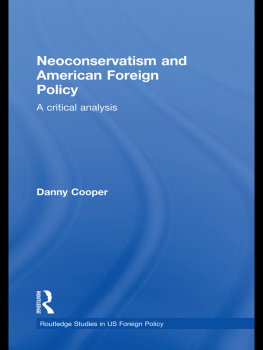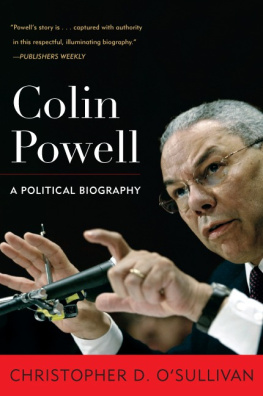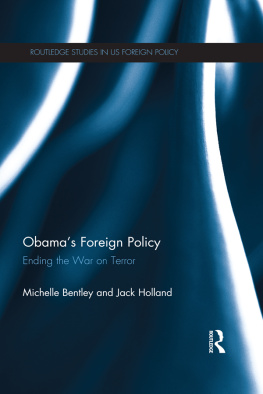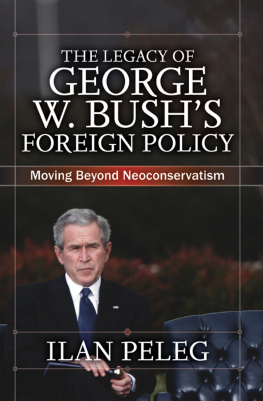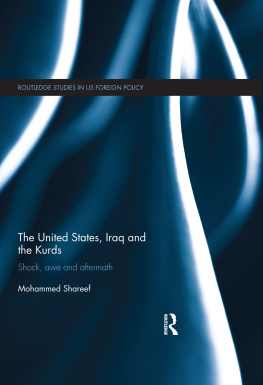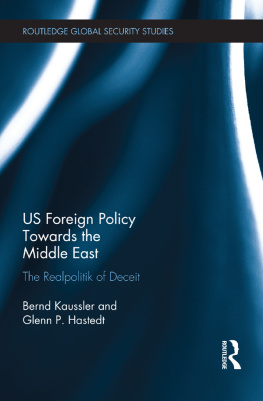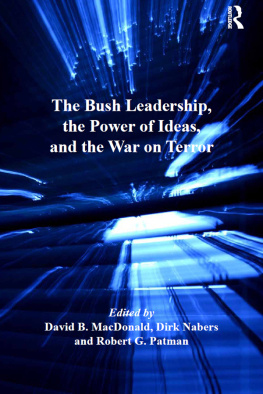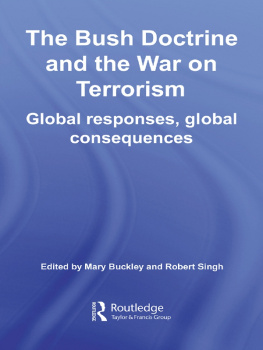Neoconservatism and American Foreign Policy
At the time of Americas 2003 invasion of Iraq, the term neoconservative was enjoying wide currency. To this day, it remains a term that engenders much debate and visceral reaction. The purpose of this book is to engage critically with a set of ideas and beliefs that define the neoconservative approach to American foreign policy, and illuminate many of the core foreign policy debates that have taken place within the United States over the past several years during the administrations of both George W. Bush and Barack Obama.
There is certainly no consensus on how neoconservatism should be defined or thought about. While authors attempt to define neoconservatism in a number of different ways, none adopt a thematic approach that can enable readers to appreciate the contributions of an intellectual community whose ideas will be forever attached to Americas decision to go to war against Iraq. This book, therefore, defines neoconservatism through the ideas and beliefs of its leading intellectual activists, casting light on the worldview of one of Americas most important and polarizing intellectual communities.
Exploring the historical significance of this ongoing movement and its impact on American foreign policy traditions, this work provides a significant contribution to the literature and will be of great interest to all scholars of foreign policy, American politics and American history.
Danny Cooper is a lecturer at Griffith University in Brisbane, Australia. His research interests include US foreign policy, international relations, and political leadership.
Routledge Studies in US Foreign Policy
Edited by: Inderjeet Parmar,
University of Manchester
and John Dumbrell,
University of Durham
This new series sets out to publish high-quality works by leading and emerging scholars critically engaging with US foreign policy. The series welcomes a variety of approaches to the subject and draws on scholarship from international relations, security studies, international political economy, foreign policy analysis and contemporary international history.
Subjects covered include the role of administrations and institutions, the media, think-tanks, ideologues and intellectuals, elites, transnational corporations, public opinion, and pressure groups in shaping foreign policy, US relations with individual nations, with global regions and global institutions and Americas evolving strategic and military policies.
The series aims to provide a range of books from individual research monographs and edited collections to textbooks and supplemental reading for scholars, researchers, policy analysts and students.
United States Foreign Policy and National Identity in the 21st Century
Edited by Kenneth Christie
New Directions in US Foreign Policy
Edited by Inderjeet Parmar, Linda B. Miller and Mark Ledwidge
Americas Special Relationships
Foreign and domestic aspects of the politics of alliance
Edited by John Dumbrell and Axel R. Schfer
US Foreign Policy in Context
National ideology from the founders to the Bush doctrine
Adam Quinn
The United States and NATO since 9/11
The transatlantic alliance renewed
Ellen Hallams
Soft Power and US Foreign Policy
Theoretical, historical and contemporary perspectives
Edited by Inderjeet Parmar and Michael Cox
The US Public and American Foreign Policy
Edited by Andrew Johnstone and Helen Laville
American Foreign Policy and Postwar Reconstruction
Comparing Japan and Iraq
Jeff Bridoux
Neoconservatism and American Foreign Policy
A critical analysis
Danny Cooper
Neoconservatism and American Foreign Policy
A critical analysis
Danny Cooper

LONDON AND NEW YORK
First published 2011
by Routledge
2 Park Square, Milton Park, Abingdon, Oxon OX14 4RN
Simultaneously published in the USA and Canada
by Routledge
270 Madison Avenue, New York, NY 10016
Routledge is an imprint of the Taylor & Francis Group, an Informa business
This edition published in the Taylor & Francis e-Library, 2011.
To purchase your own copy of this or any of Taylor & Francis or Routledges collection of thousands of eBooks please go to www.eBookstore.tandf.co.uk.
2011 Danny Cooper
The right of Danny Cooper to be identified as author of this work has been asserted by him in accordance with the Copyright, Designs and Patent Act 1988.
All rights reserved. No part of this book may be reprinted or reproduced or utilized in any form or by any electronic, mechanical, or other means, now known or hereafter invented, including photocopying and recording, or in any information storage or retrieval system, without permission in writing from the publishers.
British Library Cataloguing in Publication Data
A catalogue record for this book is available from the British Library
Library of Congress Cataloging in Publication Data
Cooper, Danny.
Neoconservatism and American foreign policy :
a critical analysis / Danny Cooper.
p. cm. (Routledge studies in US foreign policy)
Includes bibliographical references.
1. United StatesForeign relations20012009. 2. United StatesForeign relations2009 3. ConservatismUnited States. I. Title.
JZ1480.C67 2010
327.73dc22 2010017280
ISBN 0-203-84052-6 Master e-book ISBN
ISBN: 978-0-415-59221-5 (hbk)
ISBN: 978-0-203-84052-8 (ebk)
To my parents, Greg and Colleen.
And to Doris, my much missed grandmother who was the bravest
soul I knew.
Contents
Preface
In March 2003, I supported the war against Iraq. I believed in the justifications, the rationale, and I believed in America. Agreeing with many neoconservatives, the subjects of this study, I was convinced that the United States was doing the right thing. Saddam, we all know, was one of the worlds worst tyrants. He had used weapons of mass destruction against Iran and the Kurds. He had supported a number of terrorist organizations in the Middle East (al-Qaeda was not among them). And he had invaded neighboring nations. The world, I thought, would be a better place without the Iraqi dictator. That is why I supported George W. Bushs decision to remove him.
Although I have revised my views on the American invasion, I still shed no tears for the removal of Saddam Hussein. Iraq, I sincerely hope, will be better off without him. If any country deserves a future without violence and dictatorship, it is most certainly Iraq. At the time of writing, Iraq has now had its second round of national elections and the Obama administration is hoping to be able to withdraw all US combat forces by the end of 2011.
Today, I am more than prepared to acknowledge that I was wrong to support the 2003 invasion of Iraq. The horrors that the invasion unleashed are seldom appreciated or even spoken about in the West today, especially among segments of the American right. As I watched the nightly images of violence after the invasion, I was sure that America would reverse course and correct things. But it took over four years before the Bush administration did anything that would even come close to bringing a semblance of stability to Iraq. Throughout this time, I watched closely. I listened to many of the same neocons who I had once agreed with. How were they responding to the aftermath of Iraq? What lessons could be learned? The more I listened, the more I wished I had my grandmothers option of turning down my hearing aids.

